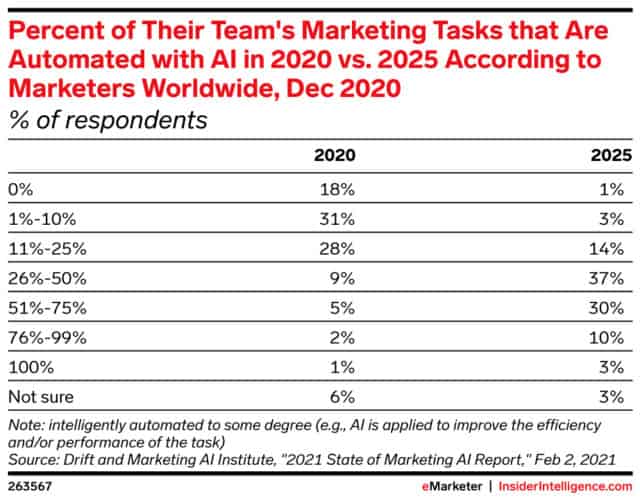
Joshua Dreller
Sr. Director, Content Marketing @ Skai

Joshua Dreller
Sr. Director, Content Marketing @ Skai

In our Skai 5 series, we discuss digital advertising tips, tricks & trends to keep you one step ahead of the consumers, the market trends and your competition. For this portion of the series, we spoke with Goodway Group’s Lisa Little to get answers about the future of AI in search marketing.
Two decades ago, digital—at the time called ‘interactive’—marketing represented less than 3% of total marketing expenditures. Today, digital has eclipsed traditional, and now more than half of all spending is on digital ads.
In many aspects, digital marketing’s meteoric twenty-year growth is tied to the rise of disruptive technologies. First, the Internet. Then broadband speeds changed the game. Then smartphones and tablets, apps, streaming video and the Internet of Things (IoT). It’s been one disruptive technology after another.
The next big technological advance is ushering in intelligent machines—namely Artificial Intelligence (AI) and machine learning. A 2020 study showed that marketers are already thinking ahead concerning the changing landscape of marketing automation.

But embracing change isn’t always easy. Turning over important tasks to computers can be a bit uncomfortable. For search marketers especially—who are used to handling everything themselves—it can feel like a loss of control. So, how does an industry adopt these powerful innovations without the worry?
Today, we speak with Goodway Group’s Lisa Little about these topics and more.

Lisa was also SearchEngineLand.com’s 2020 Search Marketers of the Year.
1) It seems that in every survey about machine learning and artificial intelligence, marketers are both excited about the potential for evolving the industry but also puzzled on how exactly it will. What do you think we will see in this area over the next five years?
It’s interesting because search marketers have actually been leveraging machine learning and automation for several years already via bidding strategies, quality scores, budget management tools, and responsive search ads (RSAs). Today we’re experiencing acceleration and advanced data/signals to leverage ML in a new and innovative way and that’s incredibly exciting!! Hate to break it to you…. but we will never know exactly what to expect or details of what will happen with ML and AI—the best thing to do is to embrace it, get comfortable with it by continually exploring and experimenting for your unique brand’s objectives and needs.
We’ve seen AI impact bidding, budgets, optimization, messaging, data-driven attribution—I believe the next five years will bring significant changes to the fundamentals of keywords, audiences, and personalization of the search experience. I don’t believe the keyword will completely go away, but instead of match types, keyword mapping/mix, and keyword selection, the future will begin making the ‘keyword’ more of a relevancy suggested input guide that fuels the machine. In turn, the real-time auction will also adjust away from relying so heavily on the specific keyword or search term.
These predictions could be off, but I know one thing—as marketers, we will have to let go of the controls we have had in the past as it relates to the keyword, become vulnerable, and approach with extreme curiosity and testing in order to adapt to these changes brought on by AI and ML. Once you shift your mindset with machine learning there is a tremendous opportunity and endless growth potential for your marketing program.
2) What is the best role for intelligent machines? What do they do better than humans? What do they have trouble doing better than us?
Machines can process, compute, and produce massive amounts of data at a sheer speed that our human brains can’t even comprehend. Machines can also collect more data points and signals in real-time considering seasonality, consumer behavior, audiences and more. Machines work better than humans within the most current infrastructure, algorithms, parameters, policies, and user experience of the platforms. There are an insane amount of changes with key platforms that a human cannot possibly keep up with and efficiently adapt to like the very machines the platforms themselves create. Lastly, machines are more error-proof, accurate, and scalable with repeatable tasks that can be automated like quality assurance checks, real-time auction bidding, and auditing.
What humans do better is think strategically about the right fuel/inputs for the machine, stress test, and perform regular maintenance checks and tweaks to the machine for the best results. Humans are also best for making sense of the information and data you’re seeing by spotting trends, insights, and then turning those findings into actionable improvements that ultimately drive real business outcomes. While machines know the platform and user activity on platforms, humans know the business objectives, unique value props, customer personas and have the ability to apply reason or logic in order to strategically guide the machine.
Do not think of automation and machine learning as ‘set it and forget it’ or replacing the marketer, but something that requires input, maintenance and human thought behind ways to leverage what the machine is collecting and how it’s operating. Machine and human are a symbiotic relationship and should coexist together with balance. Machine cannot survive solely on its own without human input and human input cannot function as quickly or comprehensively without the machine.
3) In every industry, there are some that are worried that intelligent machines may take our jobs. What’s your message to them?
To look these fears in the face and trudge ahead through the challenges, consider this comparison: Machine learning in search is like a robot vacuum cleaner. It cleans your floors for you, but first, it must learn your floor plan and understand your performance expectations. It requires regular charging, cleaning filters and maintenance. The best thing about a robot vacuum is that I can spend that hour I used to vacuum my house in a more meaningful way. I now have that time to spend with my family, exercise, or cook dinner—and the chore is still completed. It does not replace me but allows for more productive and efficient cleaning of my floors, while I can focus my time elsewhere.
Sometimes even with a robot vacuum, there is human ‘spot cleaning’ needed—a spill or high traffic area that needs a quick vacuum. There are messes in a tight space you need a specific attachment for or are not accessible to the vacuum. The concept is the same with machine learning in search—find ways to leverage automation to compliment your overall program and results. At times you will need to do manual upkeep or repair, but they should work in tandem with all aspects of the account.
As you embrace machine learning and automation in search it’s essential to keep in mind the numerous ways and aspects in which these technologies work. What they are, how they work together, when to leverage each type, how to measure impact and success. With that in mind, marketers can create the best combination for their business while keeping an open mind, staying willing to explore, innovate, impact and adjust along the way.
4) Why should marketers embrace this new technology faster than their competitors?
The sooner you can engage, get experience, find creative ways to feed the machine and action upon the insights the better. Ultimately marketers that don’t evolve with the industry will be left behind or become irrelevant and eventually extinct. Being proactive and early adoption is always more productive than waiting until it’s a required or default feature that you are thrown into and don’t have the experience or confidence to be effective.
Think of it this way: if you do not know how to swim and have never been in deep water you aren’t going to immediately jump in the middle of the ocean without a life jacket right? It’s much smarter (and safer) to take swimming lessons, learn to control your breathing, how you need to move in the water to stay afloat, and practice in a pool with lifeguards watching before you swim in the ocean. It’s the same with running a marathon. You need to train, practice, build endurance up and test your limits before successfully completing or winning a marathon race.
5) How is Goodway Group experimenting with these innovations right now and what’s the near-term roadmap?
Goodway is continually leveraging, refining, measuring, and adopting various aspects of machine learning, automation, and artificial intelligence across our client roster for all channels. We have excellence and adoption standards in place for all our core functions at Goodway. Search standards include smart bidding, responsive search ads, opti-score, automated actions, smart campaigns, and data-driven attribution.
Goodway partners closely with Skai to leverage machine learning and automation available on the platform for budget pacing/management, scalable optimization, experiments, and auditing. Our Data Science and Analytics teams also partner with Skai Budget Impact Navigator to engage with incrementality and testing across the media mix for our key clients.
We have both reactive and proactive aspects to our roadmap with machine learning so we’re keeping a proactive pulse on this movement in the industry and early adoption while continually testing, analyzing, and innovating ways to leverage on behalf of our clients for the ultimate performance.
Automation, performance and efficiency once represented the entire advantage of premium search marketing software. Today, they’re the table stakes. Search marketers looking for true competitive advantage need the tools to achieve an unbiased, holistic optimization strategy. That is where Skai comes in.
A 15-plus year history of innovation in data, bidding and measurement, combined with an independent, media-agnostic and omnichannel position, sets search marketers up to stay in control while driving true business growth—at scale.
Schedule a quick demo to see all of the great features and functionality of Skai’s paid search solutions.
If you’re looking for an experienced partner to assist your marketing team to unlock the full potential of Skai’s solutions, please contact Goodway Group.
You are currently viewing a placeholder content from Instagram. To access the actual content, click the button below. Please note that doing so will share data with third-party providers.
More InformationYou are currently viewing a placeholder content from Wistia. To access the actual content, click the button below. Please note that doing so will share data with third-party providers.
More InformationYou are currently viewing a placeholder content from X. To access the actual content, click the button below. Please note that doing so will share data with third-party providers.
More Information